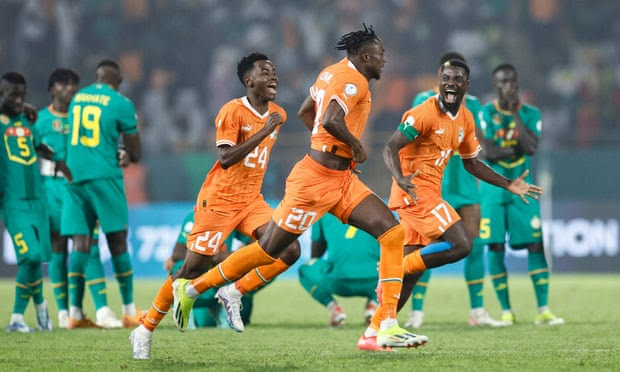
A week prior, Equatorial Guinea thoroughly thrashed Ivory Coast, scoring four goals. After eliminating the champions, they are now in the final eight of the Africa Cup of Nations. Even though this side has seemed hopeless at times before the competition started—never more so than on Monday while trailing by a goal with four minutes left—Sébastien Haller’s zombie army manages to advance to a quarterfinal matchup with either Burkina Faso or Mali.
Prior to Haller’s introduction, Senegal, who had been the strongest team during the group stage, appeared to be in charge.
This had appeared to be a textbook instance of winning the game after scoring an early goal. It was not, and thus the curse continues: since Egypt in 2010, no reigning champion has advanced to the quarterfinals. The Senegal coach, Aliou Cissé, expressed his pride and disappointment at not making it to the quarterfinals, saying, “But this is the game of football so we can’t complain.”
Ivory Coast felt that their second-half collapse against Equatorial Guinea was a final defeat, the kind of surrender that can leave a mark on a country’s memory for years. However, when they awoke a week later, they were strangely still in the competition. (Or maybe not so strangely: Ivory Coast would not have managed to finish as the best third-place team if Avram Grant’s Zambia had managed to score one more goal in either of their matches.)
Upon their return, they discovered that their coach, Jean Louis-Gasset, had been fired following the humiliation against Equatoguinea. It’s unclear exactly why the 70-year-old Frenchman—who had never played football in Africa—was there in the first place. Ivory Coast have found themselves temporarily guided by former Reading midfielder Emerse Faé, who had never coached a game in his life, following the rejection of an ambitious appeal to the France women’s team to borrow Hervé Renard, who had led them to the Cup of Nations in 2015. It all appeared very reckless for a nation that reportedly spent $1 billion organizing the competition.
Ivory Coast’s lone advantage was that they had nothing to lose because no one anticipates anything from the undead. And maybe age is less significant to zombies; the pursuit of perpetual youth likely appears pointless to the recently buried, which could account for the 36-year-old Max Gradel’s decision to open the tournament in the forward line as one of five changes following the loss to Equatorial Guinea.
The issue is that, despite their prowess against enormous, frozen walls on the northern borders, farmhouses in rural Pennsylvania, and pubs in Crouch End, the undead aren’t particularly adept at attacking crosses. After just four minutes, Habib Diallo was in the box after a left-wing delivery from Sadio Mané. He turned and blasted his shot into the top corner, putting a serious dent in Ivory Coast’s chances.
What followed gave the impression that the Ivorians were regaining some self-respect as they gained control over possession. If Mané’s lunge on Ibrahim Sangaré had resulted in a red card instead of a yellow, maybe the game would have been different, but Senegal didn’t exactly look like they were holed up in the pub cellar with an old rifle and running out of ammunition.
However, the problem with the undead is that they are infamously difficult to defeat. There was always the chance that an unsuspecting Senegalese ankle would be grabbed by a swollen arm emerging from the grave, but Édouard Mendy calmly claimed several crosses, meaning the bodies were kept safely buried until Haller, whose injury has caused Ivory so much trouble, was absent. He came on in the 72nd minute for Jean-Philipe Krasso.
Mendy had to make two stops very quickly, but the goalie took down Nicolas Pépé after Haller’s pass freed him. Ivory Coast had been lacking something, and now they could achieve it. “We needed to regain our abilities as fighters,” Faé remarked. Senegal was four minutes away from the quarterfinal when Franck Kessié’s penalty kick put them ahead. However, the clammy fingers of the rising corpse had them by the calf and had dragged them into a shootout.
Once they had them, they were unable to release them. Moussa Niakhaté of Nottingham Forest missed the post with his penalty attempt, allowing Kessié to score the game-winning kick. After Senegal’s title defense ended, the Ivorians surprisingly survived and were dancing in astonishment.


